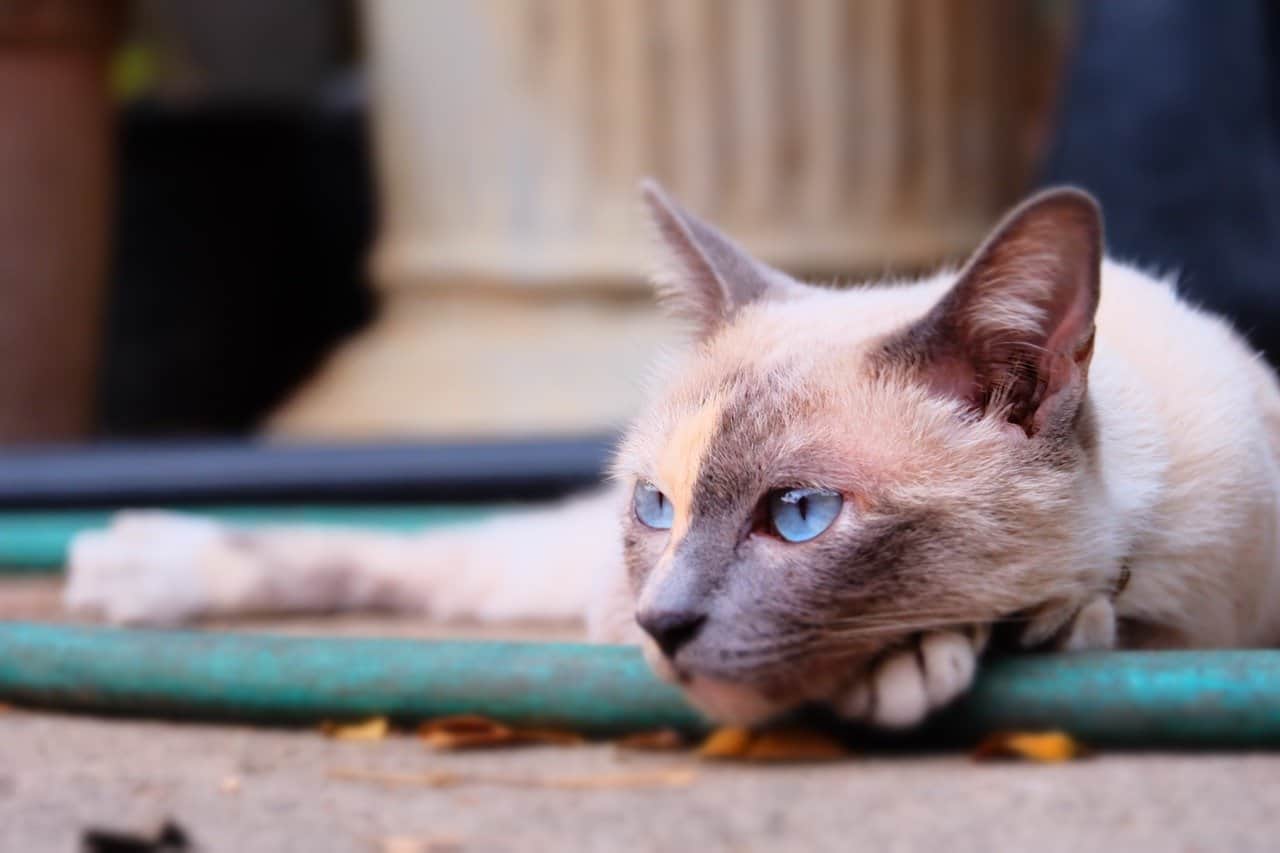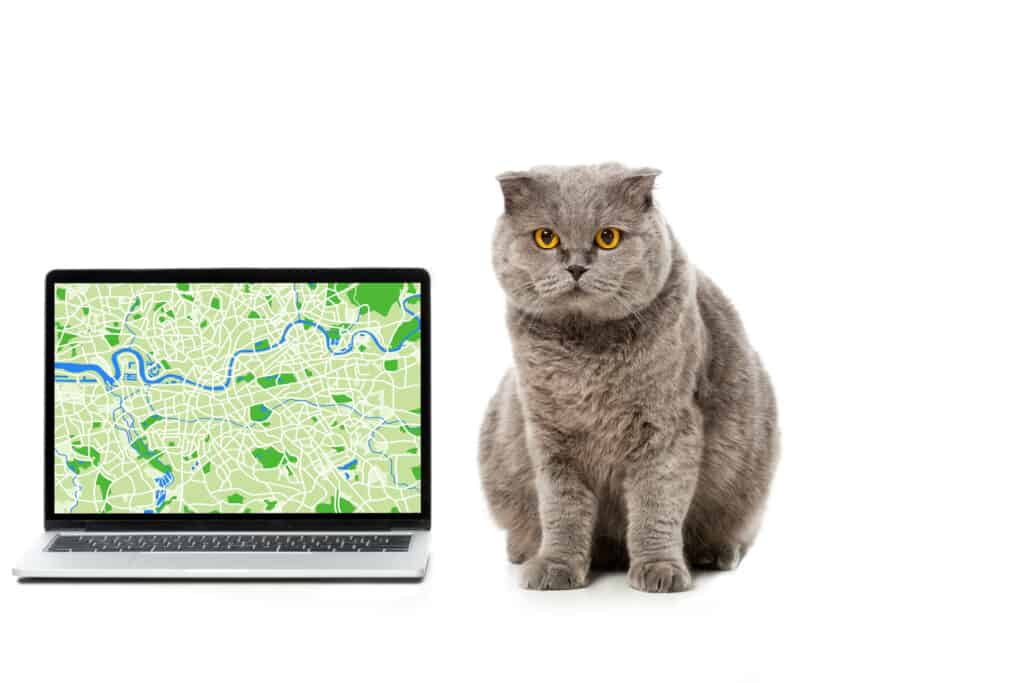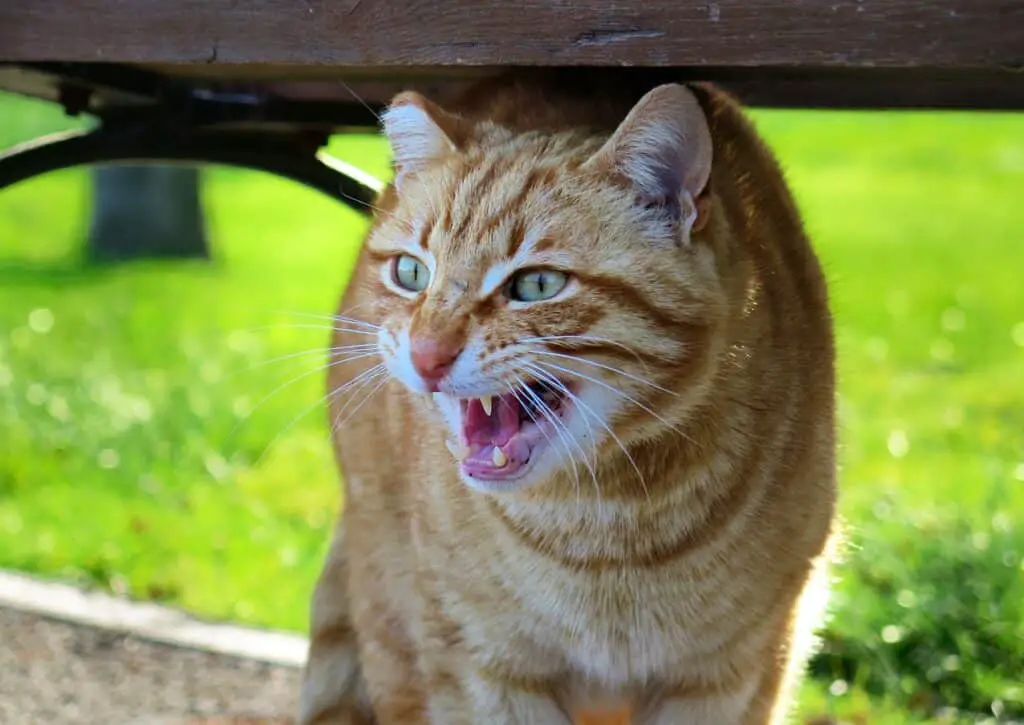Cats are among the most popular pets, second only to dogs. Statista estimated that in 2018 there were 370 million cat pets worldwide. This is understandable because there are many advantages to owning a cat. Although, as with any pet, they also come with some disadvantages.
Let’s look at the upsides and the downsides of owning a cat to help you make an informed decision if you’re still deciding whether or not to share your life with a cat.
Getting any pet is a responsibility, and being aware of the pros and cons will help you better prepare and avoid unpleasant surprises down the road.
In the table below, we have outlined several pros and cons of cat ownership, and we’ll go into more detail on each.
| Pros of owning a cat | Cons of owning a cat |
|---|---|
| Cats are great companions | Cats shed hairs |
| Cats can help control pest | Cats may rip up your furniture |
| Cats are a source of entertainment | Cats may pee in the house |
| Cats love to purr | Cats need love and attention |
| Cats can reduce stress | Cats may get sick |
| Cats don’t require a huge time commitment | Cats have a predator instinct |
| Cats can help you build a sense of responsibility | Cats may scratch you |
| Cats don’t need a lot of space | Cats cost money |
| Cats are safe pets for children | Cleaning Litter boxes |
| Cats don’t need to be walked | Cats may vomit |
| Cats are fastidious creatures | Cats may cause allergies |
Cats are great companions
Although a dog is often referred to as ‘man’s best friend’, cats can also be great companions. Unlike dogs, cats are not constantly out to please their owner, but that doesn’t mean they don’t bond with their owners.
Cats have the reputation of being aloof and preoccupied with themselves. Nothing can be farther from the truth.
Yes, cats like to have their own space but form close bonds with their owners. Because of their ability to read human emotions, cats can (and will) comfort us in difficult times and help to cheer us up. They enjoy spending time with us and miss us when we’re gone.
Cats can help control pest
If you’re living in an older house or out in the countryside, you might have an issue with mice, other rodents, or insects. Getting a cat will most likely take care of that problem quickly and naturally.
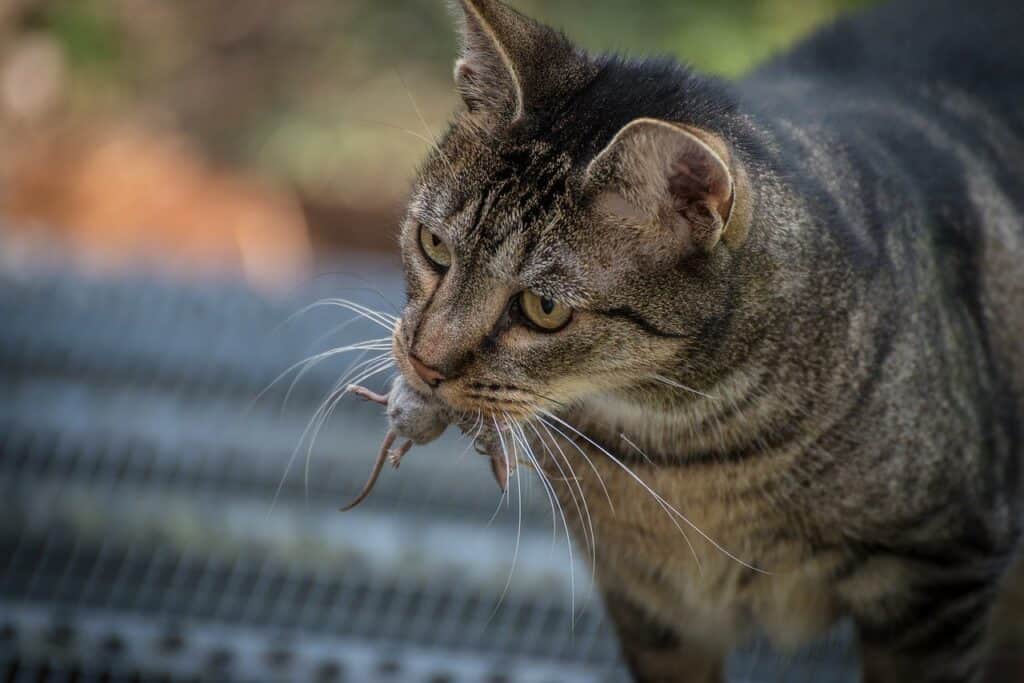
Cats are natural hunters, and their instincts are still strong even though they are domesticated. Cats enjoy the hunt, and while they won’t need to hunt prey for food, they do it to have some fun and exercise.
The only downside with this is that some cats may surprise you by offering their dead prey to you. Although this is a sign of affection and your cat telling you they want to take care of you, many of us don’t particularly appreciate this.
Cats are a source of entertainment
As a cat owner, I can attest that cats are a constant source of entertainment. Hardly a day goes by that she doesn’t do something that makes me laugh.
Especially kittens and young adult cats are very playful, and while doing so, they often get themselves in funny situations. I see my cat tumbling and jumping daily while playing with her toys. It’s something I can watch for hours.
Especially when you have kittens that grew up together, their playfulness and affection towards each other are adorable.
Cats love to purr
I’m not sure whether this qualifies as a clear advantage of having a cat, but it does. The sound of a purring cat is one of the best sounds in the world.
It is soothing and allows us to relax completely. There is some scientific evidence of cat purrs having healing power on humans.
Picture yourself chilling on the couch on a cold winter evening in front of a fireplace. Your cat is purring in your lap while you’re slowly dozing off. Isn’t that just heaven?
Cats can reduce stress
This one goes hand in hand with the previous point, and it has been proven that cats help reduce stress, anxiety, and high blood pressure, heal infections and even help heal broken bones faster.
Although a pet’s companionship has proven to be great for avoiding loneliness, cats seem to have supernatural healing powers. The exact frequency of cat purrs and the release of energy you get by petting their furry coat all seem to aid in keeping us cat-parents healthy.
Cats don’t require a huge time commitment
Unlike the most popular pet in the world, dogs and cats require a minimal time commitment.
Because cats can look after themselves and generally don’t break down the house when left alone for a few hours (like dogs), they are the ideal pets for working cat parents.
We’re not saying that cats don’t need any attention at all. They are living creatures that need love and care. Cats love to spend time with humans, and getting any pet means you will have to spend regular time with them.
The advantage is that cats understand we also need time to do our things and are not as ‘in your face’ as dogs can sometimes be.
Cats can help build a sense of responsibility
You are responsible for a living being when you get a cat or any pet. Even though we sometimes think lightly of this, it is your role to ensure your cat stays happy and healthy.
We’re not comparing pets with children, but in a way, you could say that having a pet and looking after its daily care will prepare you for parenthood like nothing else.
Committing to looking after a cat can help you get into a regular schedule. Making sure you feed your cat on time, make time to play with it, and get someone to look after it when you’re out of town for a few days is all examples of making sure you provide for your cat.
You could see this as a burden; if you do, then maybe it’s time to reconsider. On the other hand, we look at it as an advantage to help structure your life.
Cats don’t need a lot of space
Cats are ideal pets for folks living in small apartments because they don’t need much space, especially if your cat can go outside.
Even indoor cats are happy with a safe and warm sleep spot and some room to play. Domesticated cats don’t need a huge territory.
If your cat doesn’t go outside, do make sure that she gets enough exercise, though. Obesity due to lack of exercise is a real risk in cats, which often causes depression in cats. Even if you live in a small space, make time to play with your cat.
Cats are safe pets for children
A goldfish or a hamster is probably safer, but cats and children generally go very well together. It’s sometimes difficult for older cats who aren’t used to kids, but if your cat has been around children from a young age, they will be fine.
There are several adoring movies on the internet about cats taking care of babies. Female cats especially have a powerful mother instinct that extends to human babies.
Cats don’t need to be walked
Unlike dogs, cats don’t need to be walked several times daily. This makes them ideal for working cat parents who leave early morning and return home only in the evening.
If you live in the suburbs or the countryside, it’s great if you let your cat go outside to get exercise and keep them busy. Installing a cat door enables your cat to come and go when it wants.
Cats clean themselves
Cats are fastidious creatures, and as such, they spend a lot of time grooming themselves. Some people insist on bathing their cats now and then, and although we understand this can be necessary for some situations, most cats can keep themselves clean perfectly fine and don’t need a bath. Ever.
This behavior is very much unlike dogs, who enjoy rolling in dirt and muck. Since they cannot clean themselves, dogs need regular grooming and bathing.
What about the cons?
As you can see from our list above, there are many pros to getting a cat, but there can also be disadvantages that we will look at.
As you may have noticed, many of the cons in the table above start with “cats may…”. The reason is that these are downsides you may experience, but in many cases, there is a way to reduce the risk of experiencing those.
Cats shed hairs
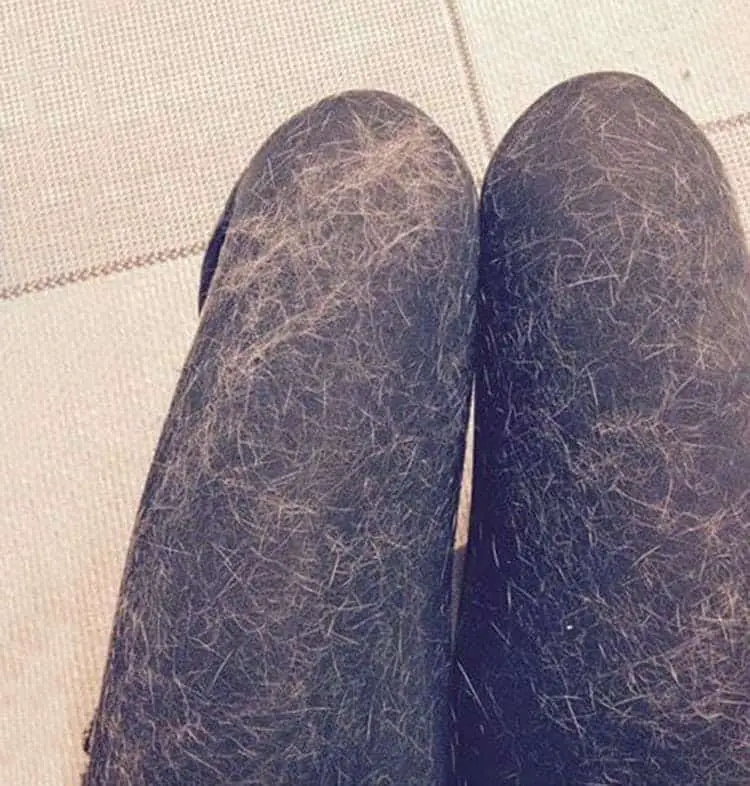
It will come as no surprise that cats shed a lot of hair. They will usually shed their coat twice a year, once during the fall to change to their winter fur and once during spring to change into their summer coat. Even outside those two periods, cats shed quite a bit of hair.
You will notice cat hairs on your furniture and clothes and where your cats like to dwell. There will be cat hairs in your bed if you allow your cat to sleep with you.
Although cat hairs are not specifically harmful, they might cause issues with people who have asthma, hay fever, or other respiratory diseases.
Regular vacuuming will help, but it’s almost impossible to eradicate.
Cats may rip up your furniture
Cats have claws, and because they don’t regularly go for a manicure, they need some way to keep their nails from getting too long.
In nature, they maintain their claws by ripping into a tree or scratching them on a rough surface.
At home, your couch or wallpaper may seem like a perfect alternative to them. Since you probably disagree, we suggest getting a cat-scratcher or clipping their nails with a special cat nail clipper.
If your cat goes outside, please don’t clip their nails, as it will make them completely defenseless against other cats.
Cats may pee in the house
Some cats spray inside the house. Both males and females, neutered or not, do this. It’s due to the natural urge to mark their territory. It may be one of the biggest cons against getting a cat because having a house that smells like a litter box is horrible.
From personal experience, I can tell you that it’s worse with some cats than others, and if your cat is allowed to go outside, you will probably not encounter this problem.
Cats need love and attention
This is hardly a disadvantage of getting a cat, but we would like to point out that, although cats are relatively self-sufficient and don’t need a lot of maintenance, they still depend on you for almost anything.
Apart from the daily care they need, such as feeding them, cleaning out their litter box, providing a safe and warm place for them to sleep, and so on, they need your love and attention most.
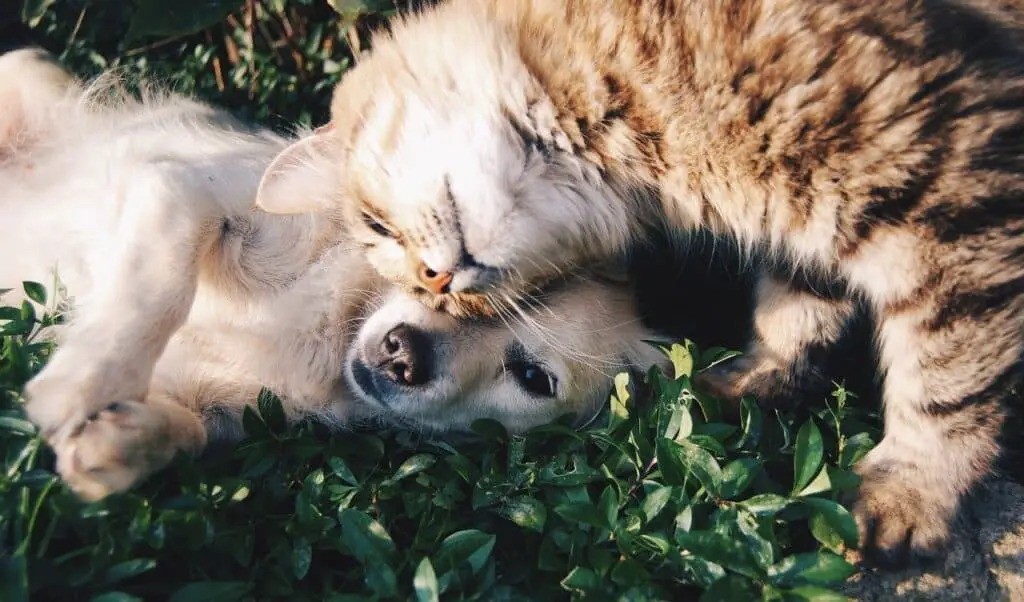
Cats can get depressed when they don’t get enough attention from their owners, and depression can cause a host of other mental and physical illnesses in your cat.
So, when you plan on getting a cat to keep you company, make sure you can spend the time to keep her company as well.
Cats may get sick
No matter how well you care for your cat, there may come a day that your cat gets sick. Some cats are stronger, but many ailments can affect your cat.
When left untreated, most of these conditions will get worse and may end up killing your cat in the process. Make sure you see a vet on time to catch diseases early and get treatment.
Even when your cat is not sick, prevention is essential. Ensure your cat gets all the necessary vaccinations, and if you don’t want to end up with a litter of kittens, getting your cat neutered is a good idea.
Vets can be expensive, and if your cat needs surgery, it’s easy to rack up bills of several hundreds of dollars. Luckily there are many options for pet healthcare insurance that will not always cost you an arm and a leg.
Cats have a predator instinct
Although domesticated cats don’t need to hunt for their food, their instincts are still strong, and they like to enact the hunt for fun and exercise.
Even if you have an indoor cat, they might hunt imaginary prey or your slippers. However, if your cat goes outside, they may bring you a present in the form of a dead rodent or bird, often minus the head.
This is probably not the present you’d like to receive, but it’s a big deal for your cat. By giving you its prey, it’s telling you that they’ll take care of you. Never scold your cat when they bring you their prey. Thank her and throw it out when she’s not looking.
Cats may scratch you
Scratching is a cat’s defense mechanism. Although they might sometimes accidentally scratch you while playing, this is rare.
It’s a risk to consider with small kids who might make sudden movements or be rough with your cat, which might cause it to lash out.
On the other hand, most cats that are used to kids will just walk away and find a quiet spot if it gets too much for them.
Generally, cats will not scratch people for no reason, but it’s a risk worth considering.
Cats cost money
Something that few people consider before getting a cat, or any pet for that matter, is the financial implication.
Cats cost money to raise and take care of. Apart from the daily necessities like food and cat litter, several other expenses may not seem evident initially. Examples of this are: vets and vaccinations, getting it neutered, getting it microchipped, necessities like a cat bed, bowl, toys, travel expenses, cleaning fees, etc.
The website moneyunder30.com had a good post about a cat’s cost and how to prepare for it.
Cleaning litter boxes
Even the greatest cat lovers among us never look forward to cleaning a litter box. This is just one of those tasks that come with a cat, but no one enjoys it.
Cat poop and pee are smelly, and you must clean the litter box every other day.
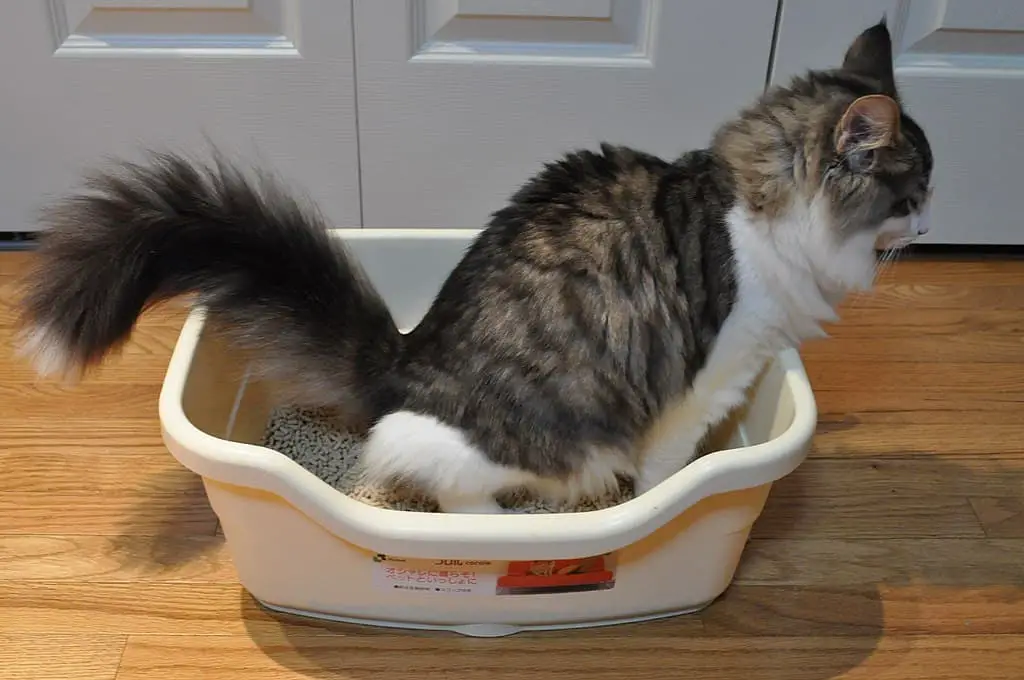
Cats may vomit
Cats throwing up hairballs is entirely normal and natural, and it is something that you will have to deal with as a cat owner.
Strangely they prefer to throw up on soft surfaces like your couch, your rug, or other places that are hard to clean.
Cats may cause allergies
Due to their fine hairs, cats are known to cause allergies in people sensitive to those hairs or prone to asthma or other respiratory problems.
Consider whether getting a cat is suitable for you if you can’t deal with cat hairs and dust.
A good alternative is looking into whether a Siamese Cat or a Russian Blue is an option for you. Both breeds are hypoallergenic and are the best choice for people with allergies.
Final thoughts
Getting a cat is a big decision because they will likely be with you for many years. It’s easy to take this decision lightly, and because they’re so cute, you might not oversee all the implications at first.
On the other hand, we think many pros heavily outweigh the cons of getting a cat. We hope this article helped provide a clear perspective on the upside and the downside of having a cat.
Feel free to ask us any questions in the comments.

